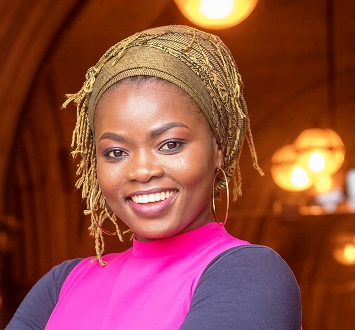A University of Glasgow student is using maths and computing skills to train young scientists in Africa to help push the frontiers of knowledge in science and technology.
Sofiat Olaosebikan, supported by students and staff at the University of Glasgow, has set up an initiative to teach and empower young scientists with the skills they need to help drive innovative research in the African continent.
Sofiat, is originally from Nigeria and is a PhD Computing Science student at the College of Science and Engineering in Glasgow, said: “There are lots of problems in Africa that need to be solved. My goal is to raise an army of intellectuals that are going to contribute to the development of Africa.
“I want to empower young scientists in Africa with the skills to help them bridge the gap between their pre-existing knowledge and real-world scientific problems. I believe that this will help them grow to become innovate thinkers who will push Africa forward on the frontiers of science and technology.
Empowering opportunities through capacity building
“I am a good example of one such African scientist who was empowered by the opportunities I have been given. This initiative was born out of a strong desire to give back to the community by helping other young scientists in Africa and show them what is possible.”
Since 2018, Sofiat with the support of the University’s School of Computing Science, has delivered computer programming workshops in Nigeria and Rwanda through her PWSAfrica project – which stands for Programming Workshop for Scientists in Africa.
She added: “For my team and I, the experience and the impact we have been able to make was worth all the effort to set up this initiative. For some of those that we worked with, they saw where I am right now as something they couldn’t achieve.
“But me standing in front of them teaching them something that they aspire to know and the fact I was also in their shoes only a few years ago, they tell me felt like an inspiration to them.”
Professor Chris Johnson, Head of the School of Computing Science, said he is fully supportive of PWSAfrica and the work being carried out by his students and colleagues: “The University is not an inward-looking institution. It shouldn’t be just about the campus or the building you are based in. It should be about your ability to get out, to influence how people think and how people learn in different countries.”
“With all the pressures that exist today in University life to bring in research grants and to teach increasingly larger numbers of students, it is absolutely fantastic when a few people do something different and challenge preconceptions and go out and do something that I think is important.”
Ifeoma Okoh and John Paul took part in the Nigerian workshop in 2018, and this year returned to PSWAfrica as tutors in Rwanda.
Ifeoma said: “Sofiat has brought so much empowerment to us from the UK to Nigeria. We have so much potential in Nigeria but sometimes it is the opportunity to actually show that which is missing.”
John Paul, who has now got a job at a software company where he hopes to design a new app to help detect breast cancer, said: “Sofiat is awesome and is such an inspiration. I want to be just like Sofiat.”
Rachel Sandison, Vice-Principal, External Relations commented that: “Sofiat is an excellent example of the University of Glasgow’s world-changing student community who are committed to making a difference at both a local and global level. We are incredibly proud of Sofiat’s achievements and ambitions, and are delighted that we can provide the supporting framework to make these dreams a reality.”
From University of Ibadan to Glasgow
Sofiat completed her undergraduate studies at the University of Ibadan in Nigeria before getting accepted to a fully funded masters programme at the African Institute of Mathematical Sciences (AIMS). In 2016, she moved to Glasgow after being accepted for a PhD at the University’s School of Computing Science.
Sofiat said: “Throughout my education in Ibadan, I lacked access to learn programming because there were no opportunities available to me. I was introduced to Python programming at AIMS, after which I went on to consolidate the skills by learning online. Although my Python programming skills are largely self-taught, the exposure I got from AIMS made a significant impact on that journey. It is that lack of access to programming education in Africa that gave me the idea to start PWSAfrica.”
In 2018, with the support of the School of Computing Science, PWSAfrica started off a workshop series at the University of Ibadan in Nigeria, delivering two weeks of training which focused on the fundamental concepts of computer programming for scientific purposes.
Sofiat’s fellow PhD researchers and teaching assistants volunteered their own time and expertise to travel to Africa with her to work as tutors in the PWSAfrica workshops.
Sofia said: “In our first two-week long workshop we trained over 100 undergraduate and postgraduate students from various STEM departments on the basics of Python programming. It was a wonderful start and a huge success – for the students’ experience, and their voracious appetite for learning; for the team’s incredible journey, and the knowledge we imparted.
“This year, the project ran a second workshop at the University of Rwanda. We are very proud of what we’ve achieved so far, and we’re excited about making even more impact.”

































